England’s successful diabetes prevention program as blueprint for Canada
Canada can learn from England’s diabetes prevention program to build its own initiatives to combat rising rates of diabetes, argue a team of experts
Diabetes is one of the fastest-growing and most costly chronic diseases in Canada, with approximately 201,000 new cases diagnosed each year. According to Diabetes Canada, the number of Canadians with diabetes has doubled since 2000 and 30 per cent of Canadians—about 12 million people—live with diabetes or prediabetes.
To help reverse this trend—which reduces the quality of life for millions and drives up health care costs—a team led by Dr. Kaberi Dasgupta of the Research Institute of the McGill University Health Centre (The Institute) is calling for the creation of evidence-based prevention programs modelled on successful initiatives in England. Their proposal is detailed in a new analysis published in CMAJ (Canadian Medical Association Journal).
“Prediabetes—a condition where blood glucose levels are higher than normal, but not high enough for a diagnosis of type 2 diabetes—significantly increases the risk of progressing to type 2 diabetes. An estimated 6 million Canadians live with prediabetes, and more than half of them will develop type 2 diabetes within the next 8 to 10 years, if no action is taken. The good news is, prevention works,” says Dr. Dasgupta, Senior Scientist in the Metabolic Disorders and Complications Program at The Institute.
Prevention is possible—and proven to succeed
Based on strong evidence showing that diet and exercise can delay or prevent type 2 diabetes, England’s National Health Service (NHS) launched publicly funded prevention and remission programs that have achieved measurable results. The NHS initiative has lowered diabetes incidence rates from 64.3 to 53.4 per 1000 person-years among individuals with prediabetes, and the program is projected to save $121 million (CAD) over 35 years by reducing treatment costs and complications.
Inspired by this success, a multidisciplinary team of clinician-scientists, legal scholars and health economists—many of whom are members of Diabetes Québec’s professional council—has partnered with NHS leaders to assess the feasibility of adapting this model in Quebec. Their work is funded by the Canadian Institutes of Health Research (CIHR) and aligns with the Framework for Diabetes in Canada released by the Government of Canada in 2022, which calls on provincial and Indigenous governing bodies to develop community-based programs to improve access to diabetes prevention and care.
A made-in-Quebec model for national impact
The plan is to develop programs in Quebec and use their success to drive broader change across the country—much like how Quebec’s early childhood education and care system influenced Canada’s national childcare policy.
“Our goal is to build successful programs in Quebec that will catalyze programs across Canada,” says Dr. Dasgupta, who is also an internal medicine specialist at the McGill University Health Centre and Full Professor of Medicine at McGill University. “In our view, if one province successfully builds a program, it will catalyze others and attract federal funding.”
She draws a historical comparison to Medicare, which began as a provincial initiative in Saskatchewan and ultimately became the foundation of Canada’s publicly funded health care system.
“With prediabetes and type 2 diabetes rates on the rise, urgent action is needed,” adds Dr. Dasgupta. “The English model offers a tested, cost-effective approach that Canada could tailor to its health system—with the potential to save lives and reduce the burden on future generations.”

